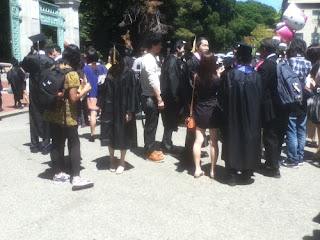Alas, the natural human impulse to wish disaster into a fuzzily-remembered past is, in the case of Fukushima Daiichi, only making it easier for a rapacious industry to ... well, to continue in its rapacious ways. From Reuters this past Friday, in Japan eyes smaller nuclear role but no exit strategy:
Japan is leaning toward a policy of halving nuclear power's share of electricity supply from pre-Fukushima levels to about 15 percent by 2030, but will likely stop short of pledging the long-term exit strategy that many voters favour, experts said.
That would be a victory of sorts for a nuclear industry that has been under fire since a huge earthquake and tsunami devast[at]ed the Fukushima atomic plant in March 2011, triggering meltdowns in the world's worst radiation accident in a quarter century.
But ... isn't it over yet? From the SF Chronicle in Tuesday's print edition of the paper, headlined on-line as Japan's radiation found in California bluefin tuna:
For the first time, scientists have detected radioactivity in fish that have migrated into California waters from the ocean off Japan, where radiation contaminated the sea after explosions tore through the Fukushima nuclear reactors last year.And ... don't they have it under control? From the NY Times on Monday, when many 'Mericans were busy with their barbecues:
[...]
The evidence is "unequivocal" that the tuna - caught off San Diego a year ago - were contaminated with radiation from Japan's nuclear disaster, the researchers said.
In an unusually stark warning, Japan’s prime minister during last year’s nuclear crisis told a parliamentary inquiry on Monday that the country should discard nuclear power as too dangerous, saying the Fukushima accident had pushed Japan to the brink of "national collapse."As I've written before, Satisfying energy requirements of a culture built on massive distribution of goods across the globe, high-tech warfare, inefficient human transport, digital-everything, the intertubes that carry information between digital-everything, and energy-intensive food production is a road leading straight off the cliff.
In testimony to a panel investigating the government’s handling of the nuclear disaster, the former prime minister, Naoto Kan, also warned that the politically powerful nuclear industry was trying to push Japan back toward nuclear power despite "showing no remorse" for the accident.
"Gorbachev said in his memoirs that the Chernobyl accident exposed the sicknesses of the Soviet system," Mr. Kan said, referring to the 1986 explosion of a reactor in Ukraine, which spewed radiation across a wide swath of Europe. "The Fukushima accident did the same for Japan."
That's why I found Tim Jackson's piece in the NY Times on Saturday, Let's Be Less Productive, such a refreshing, out-of-the-box take on what is to be done. Not that I expect seven billion people to take heed. Still, worth a read and a thought (bolded emphasis added by yours truly):
A whole set of activities that could provide meaningful work and contribute valuable services to the community are denigrated because they involve employing people to work with devotion, patience and attention.The SF Chronicle's article cited above about cesium-134 and cesium-137 found in tuna swimming off San Diego went to great pains to assure tuna-consuming U.S. citizens that there's nothing to worry about:
But people often achieve a greater sense of well-being and fulfillment, both as producers and consumers of such activities, than they ever do in the time-poor, materialistic supermarket economy in which most of our lives are spent. And here perhaps is the most remarkable thing of all: since these activities are built around the value of human services rather than the relentless outpouring of material stuff, they offer a half-decent chance of making the economy more environmentally sustainable.
Of course, a transition to a low-productivity economy won’t happen by wishful thinking. It demands careful attention to incentive structures -- lower taxes on labor and higher taxes on resource consumption and pollution, for example. It calls for more than just lip service to concepts of patient-centered care and student-centered learning. It requires the dismantling of perverse productivity targets and a serious investment in skills and training. In short, avoiding the scourge of unemployment may have less to do with chasing after growth and more to do with building an economy of care, craft and culture. And in doing so, restoring the value of decent work to its rightful place at the heart of society.
Virtually all bluefin tuna on the market in the United States is either farmed or caught far from the Fukushima area, so American consumers should not be affected by radiation contamination in their fish, seafood distributors say. The migratory bluefin studied by the researchers were all caught by sport fishermen and were not headed for the market.
[...]
"We don't think there will be any public health concern from the results of the new tests," Fisher [a marine scientist internationally known as a specialist in radiation hazards at Stony Brook University on Long Island] said, "but if we do see any higher concentrations of cesium, we will certainly alert public health agencies again."
Feel better yet?
Related posts on One Finger Typing:
Thinking of Fukushima on Earth Day
Nuclear meltdown abroad and at home
The radiation cloud is blowing in the wind
Facing things we'd rather weren't so





















